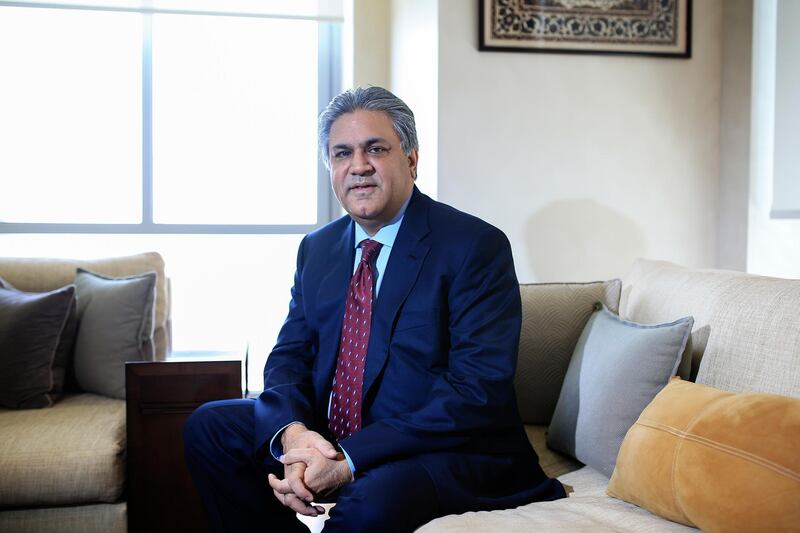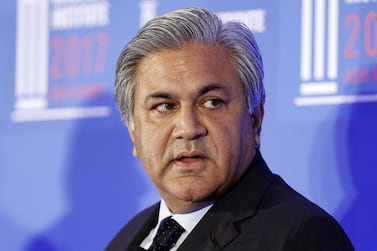Fourteen months after concerned investors commissioned an investigation into a $1 billion (Dh3.67bn) healthcare fund managed by the Abraaj Group, two former executives were charged with fraud in the US.
The arrests underscore the long arm of the law across jurisdictions and demonstrates that companies seeking international investment must withstand heightened scrutiny and demonstrate transparency, analysts say.
The arrests of Abraaj founder Arif Naqvi and former managing partner Mustafa Abdel-Wadood last week sent shock waves through the finance industry as it revealed the depth of the company's troubles. The scandal has also highlighted the need for local regulators to prosecute companies when corporate governance fails, according to asset managers, former Abraaj employees and analysts. International frameworks for financial regulation means executives committing a crime in one jurisdiction can be liable for their illegal activity in another.
"In the past, it was possible for people to commit fraud and run from Dubai, leaving their car in the airport and not worry about the consequences," Tarek Fadlallah, chief executive of Nomura Asset Management Middle East, said. "The scenario has changed ... the arm of the law was still able to reach [Arif Naqvi]."
The insolvent Dubai-based private equity firm, which had almost $14 billion of assets under management in 2018, was forced into liquidation in June last year after four investors, including the Bill & Melinda Gates Foundation, commissioned an audit to investigate the alleged mismanagement of money in its healthcare fund.
Abraaj and Mr Naqvi have denied any wrongdoing.
"This was a lot deeper than anyone had imagined, if the allegations are in fact true," Mr Fadlallah said.
With the inclusion of more countries in the region in the MSCI emerging markets index, companies have the ability to attract more institutional investors but are also obliged to maintain regulations on transparency and disclosure.
"If you contravene or deem to contravene US laws, especially the securities act or investor protection legislation, the arm of US law can reach you, it's a major message," Dr Nasser Saidi, of Nasser Saidi and Associates, said. "If you're going to be attracting international investors, especially from the US which is highly litigation-prone, then companies need to ensure higher compliance standards and need to be extra diligent."
A former Abraaj employee said the company had little transparency as Mr Naqvi and a close-knit number of associates made most of the decisions without including many senior employees, he said, speaking on condition of anonymity.
"Arif kept a very tight circle of people around him," he said. "It was a pretty closed culture, the circle ran the show, so to speak."
The arrest of Abraaj's founder deals a major blow to private equity companies in the Middle East, making it more difficult to attract international investors or raise funds, analysts say.
"This is unfortunately the saddest part of the whole saga," Mr Fadlallah said. "It casts a shadow over the industry and it's going to cost them more in terms of better due diligence and investing in compliance."
The regional private equity industry was already suffering from slower returns following the financial crisis of 2008 and the ongoing Abraaj saga damages its credibility with global investors, leading to fewer deals and weaker economic contribution. In the long run however, Abraaj will be a lesson for the industry to improve on corporate governance and due diligence, implement regulations and ensure compliance, industry watchers say.
"I'm already hearing people say they don't want to be the next Abraaj," the company's ex-employee said.
Abraaj's collapse means the regional private equity industry, which was embryonic a decade ago, had to go through pains to reach maturity.
“This issue of good corporate governance is critical if you want to give confidence to investors or attract local and international investors. Here, there seems to be a clear failure of good corporate governance," Dr Saidi said. "It shouldn’t be for others to reveal it. We need to be more diligent in enforcement.”
He added that the Abraaj case highlights the need for local regulators to be more active in ensuring compliance and pursuing companies or people if they are found to break laws and regulations.
The executives' arrests "highlight the seriousness of the accusations made and whether there will be further responses from the local regulators," Khalid Howladar, managing director and founder of Acreditus, a boutique risk and regulatory advisory firm based in Dubai, said.








